
Martin Kolk
@martinkolk.bsky.social
Demographer at Stockholm University and the Institute for Future Studies.
https://www.su.se/profiles/mkolk
https://www.su.se/profiles/mkolk
Här kan man se en diskussion om barnafödande i SVTs kulturnyheter, där det vrids och vänds på sjunkande barnafödande i olika perspektiv.
www.svtplay.se/video/KZmQoQ...
www.svtplay.se/video/KZmQoQ...

Kulturnyheterna special: En framtid utan barn
Sverige har idag de lägsta födelsetalen sedan 1751 och regeringen har tillsatt en utredning för att svara på varför. Men även runt om i världen sjunker födelsetalen. Handlar det om politik, teknik, in...
www.svtplay.se
September 30, 2025 at 8:26 PM
Här kan man se en diskussion om barnafödande i SVTs kulturnyheter, där det vrids och vänds på sjunkande barnafödande i olika perspektiv.
www.svtplay.se/video/KZmQoQ...
www.svtplay.se/video/KZmQoQ...
In our new study in Population and Environment, we examine how environmental concerns shape public attitudes toward childbearing in Sweden. We find views linking environmental concerns with reproduction are widespread, even if we find less support that they affect behavior.
doi.org/10.1007/s111...
doi.org/10.1007/s111...

August 19, 2025 at 12:45 PM
In our new study in Population and Environment, we examine how environmental concerns shape public attitudes toward childbearing in Sweden. We find views linking environmental concerns with reproduction are widespread, even if we find less support that they affect behavior.
doi.org/10.1007/s111...
doi.org/10.1007/s111...
Sweden reached near gender parity in employment in the late 1980s, and if anything, the gender gap has increased since then.
There used to be near-universal employment among Swedish men, with Swedish women nearly catching up in the 1980s.
Swedish labor force survey, age 35-44.
There used to be near-universal employment among Swedish men, with Swedish women nearly catching up in the 1980s.
Swedish labor force survey, age 35-44.

August 11, 2025 at 4:17 PM
Sweden reached near gender parity in employment in the late 1980s, and if anything, the gender gap has increased since then.
There used to be near-universal employment among Swedish men, with Swedish women nearly catching up in the 1980s.
Swedish labor force survey, age 35-44.
There used to be near-universal employment among Swedish men, with Swedish women nearly catching up in the 1980s.
Swedish labor force survey, age 35-44.
I dag publicerades min artikel på DN Debatt där jag argumenterar för en höjning, och beskattning av barnbidraget, baserat på att vi ser ökade socioekonomiska skillnader i föräldraskap.
www.dn.se/debatt/hoj-b...
www.dn.se/debatt/hoj-b...

DN Debatt. ”Höj barnbidraget – unga familjer måste prioriteras”
DN Debatt. I takt med att barnafödandet minskar bör barnbidraget höjas och göras skattepliktigt, skriver Martin Kolk, docent i demografi.
www.dn.se
August 10, 2025 at 9:59 AM
I dag publicerades min artikel på DN Debatt där jag argumenterar för en höjning, och beskattning av barnbidraget, baserat på att vi ser ökade socioekonomiska skillnader i föräldraskap.
www.dn.se/debatt/hoj-b...
www.dn.se/debatt/hoj-b...
Se en ny artikel i Svenska Dagbladet där jag intervjuades om huruvida de senaste 10-årens sjunkande barnafödande är ett socioekonomiskt problem eller inte.
www.svd.se/a/4BpQ96/for...
www.svd.se/a/4BpQ96/for...

Forskaren: Inget problem med färre barn
Det låga barnafödandet i Sverige gäckar regeringen, som nu har tillsatt en utredning. Men utredningens problemformulering ifrågasätts av demografiforskaren Martin Kolk. ”Personligen tycker jag inte at...
www.svd.se
July 20, 2025 at 9:37 PM
Se en ny artikel i Svenska Dagbladet där jag intervjuades om huruvida de senaste 10-årens sjunkande barnafödande är ett socioekonomiskt problem eller inte.
www.svd.se/a/4BpQ96/for...
www.svd.se/a/4BpQ96/for...
In a new preprint by Linus Andersson, myself and Jan Saarela, we tracks every marriage in Finland 1972 2020 to show how religious conversions shape endogamy — and how those patterns differ for men and women.
doi.org/10.17045/sth...
doi.org/10.17045/sth...

July 16, 2025 at 1:28 PM
In a new preprint by Linus Andersson, myself and Jan Saarela, we tracks every marriage in Finland 1972 2020 to show how religious conversions shape endogamy — and how those patterns differ for men and women.
doi.org/10.17045/sth...
doi.org/10.17045/sth...
Reposted by Martin Kolk
I'm happy to share that the 2nd paper of my PhD "Assessing the validity of microsimulated kinship networks using Swedish population registers", with @demography.bsky.social, @martinkolk.bsky.social and @ezagheni.bsky.social, is available as an MPIDR Working Paper share.google/g0nVmiSI6huB...

MPIDR - Publications
The Max Planck Institute for Demographic Research (MPIDR) in Rostock is one of the leading demographic research centers in the world. At the MPIDR, researchers from all over the world investigate demo...
share.google
July 8, 2025 at 7:10 AM
I'm happy to share that the 2nd paper of my PhD "Assessing the validity of microsimulated kinship networks using Swedish population registers", with @demography.bsky.social, @martinkolk.bsky.social and @ezagheni.bsky.social, is available as an MPIDR Working Paper share.google/g0nVmiSI6huB...
Reposted by Martin Kolk
Parenthood among same-sex couples has changed as policy & social contexts have evolved. Swedish data revealed that same-sex parenting increased over time among women, but remained rare among men.
👉 New paper by Mollborn, @martinkolk.bsky.social & Evertsson
🔗 genus.springeropen.com/articles/10....
👉 New paper by Mollborn, @martinkolk.bsky.social & Evertsson
🔗 genus.springeropen.com/articles/10....
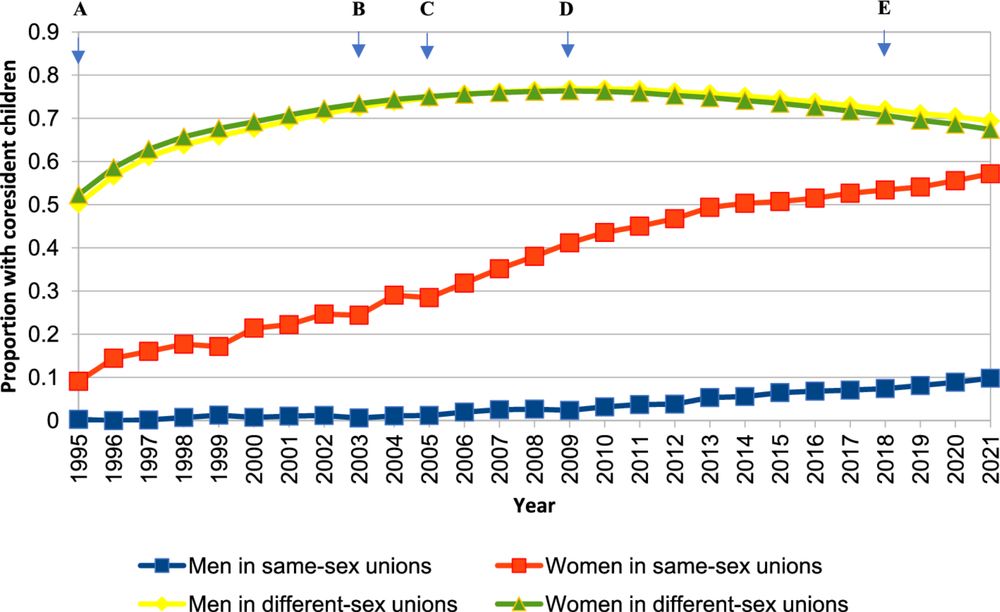
Recent trends in parenthood in Swedish same- and different-sex legal unions: emerging gender and socioeconomic differences - Genus
Parentalization, or becoming a parent and being legally and socially recognized as such, has long been constrained for sexual minorities. Although many studies have examined the outcomes of children o...
genus.springeropen.com
July 8, 2025 at 8:59 AM
Parenthood among same-sex couples has changed as policy & social contexts have evolved. Swedish data revealed that same-sex parenting increased over time among women, but remained rare among men.
👉 New paper by Mollborn, @martinkolk.bsky.social & Evertsson
🔗 genus.springeropen.com/articles/10....
👉 New paper by Mollborn, @martinkolk.bsky.social & Evertsson
🔗 genus.springeropen.com/articles/10....
Reposted by Martin Kolk
🚨Check out the latest @vypr.bsky.social Data&Trends. Jonas Wood and colleagues investigate urban-rural differences in northern and western Europe regarding women’s educational gradients in fertility.
🔗 austriaca.at?arp=0x004055...
#demography
@demographyvienna.bsky.social
🔗 austriaca.at?arp=0x004055...
#demography
@demographyvienna.bsky.social
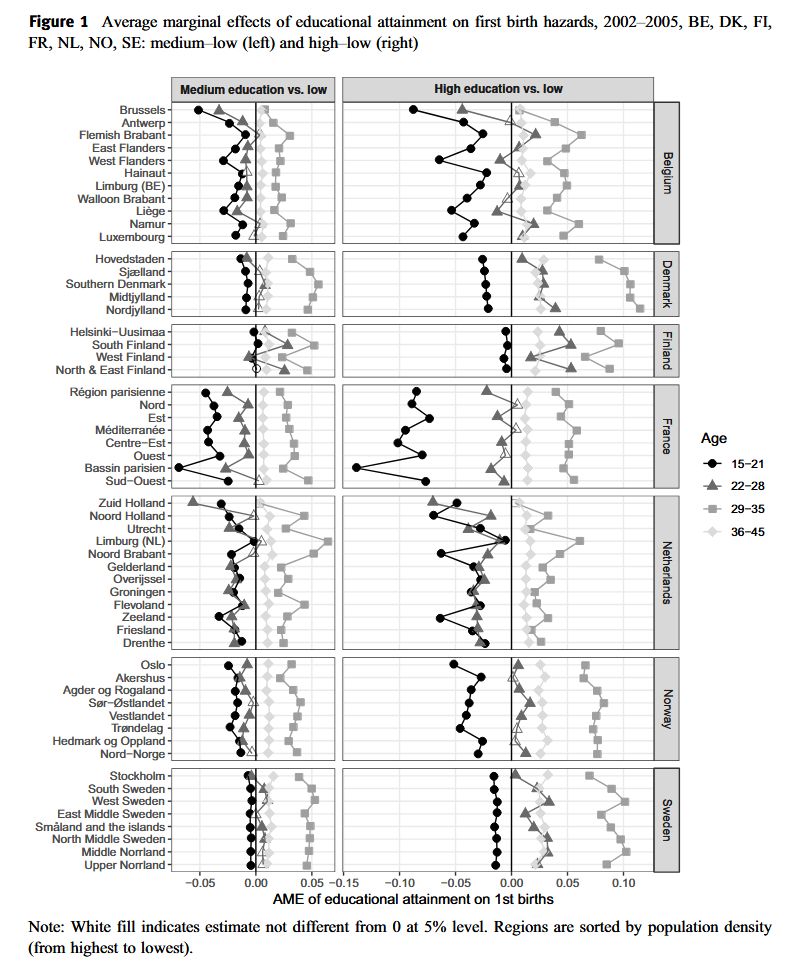
May 28, 2025 at 8:02 AM
🚨Check out the latest @vypr.bsky.social Data&Trends. Jonas Wood and colleagues investigate urban-rural differences in northern and western Europe regarding women’s educational gradients in fertility.
🔗 austriaca.at?arp=0x004055...
#demography
@demographyvienna.bsky.social
🔗 austriaca.at?arp=0x004055...
#demography
@demographyvienna.bsky.social
I think these types of criticisms of quantitative models in the social sciences are largely on point.
My solution would be to rely more on simple descriptive and large high powered studies to build robust findings, before moving towards more complicated (and much more fragile) designs.
My solution would be to rely more on simple descriptive and large high powered studies to build robust findings, before moving towards more complicated (and much more fragile) designs.
I think the current state of social science research is pretty bad and I wrote something for @asteriskmag.bsky.social about it. asteriskmag.com/issues/10/ca...
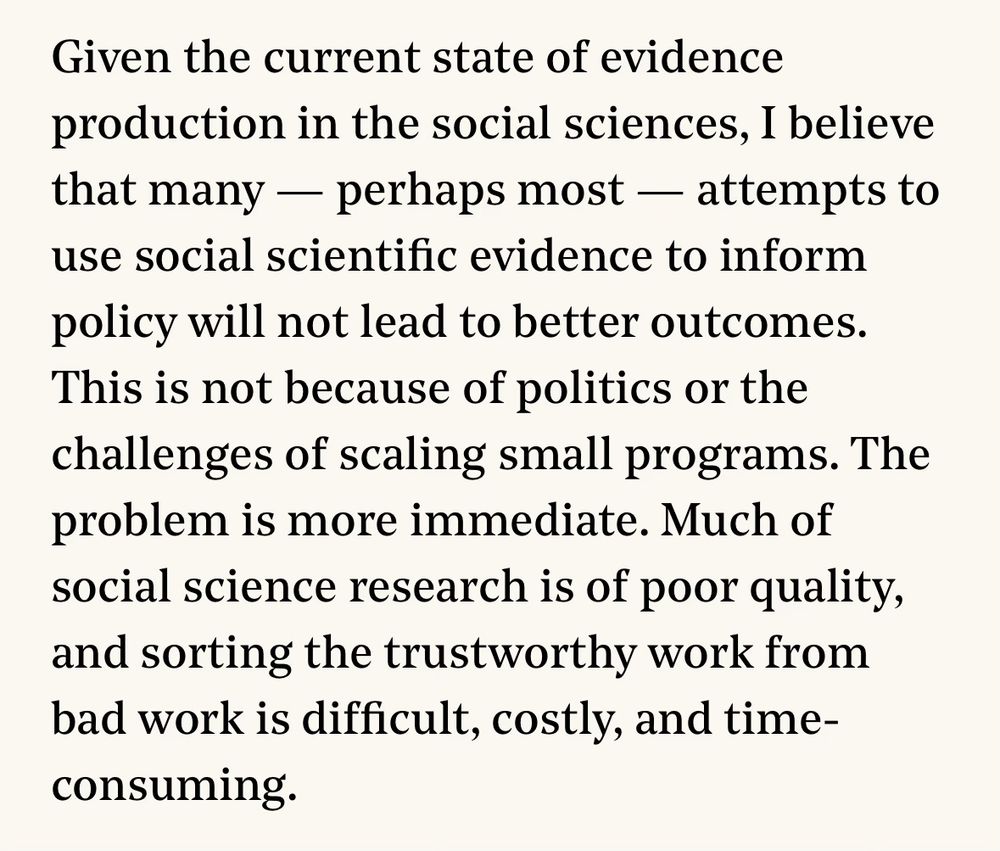
May 19, 2025 at 8:29 PM
I think these types of criticisms of quantitative models in the social sciences are largely on point.
My solution would be to rely more on simple descriptive and large high powered studies to build robust findings, before moving towards more complicated (and much more fragile) designs.
My solution would be to rely more on simple descriptive and large high powered studies to build robust findings, before moving towards more complicated (and much more fragile) designs.
Reposted by Martin Kolk
With a little delay we learned that @lpcalderonb.bsky.social, who could not attend #PAA2025, won a Best Poster Award! Her colleagues put up the poster and a note from Liliana and co-author @martinkolk.bsky.social jumped in to present the research. Congrats Liliana! @popassocamerica.bsky.social
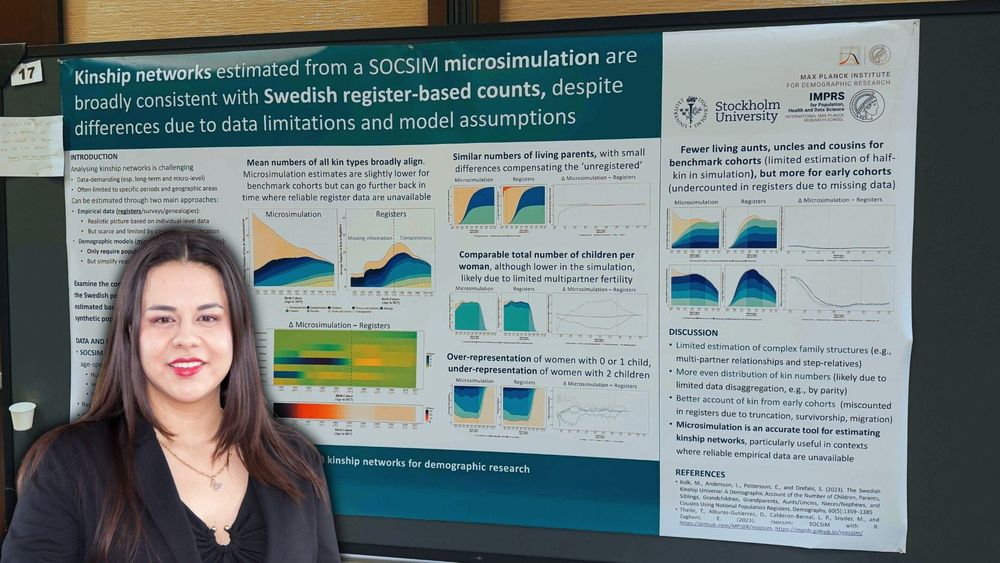
April 30, 2025 at 9:46 AM
With a little delay we learned that @lpcalderonb.bsky.social, who could not attend #PAA2025, won a Best Poster Award! Her colleagues put up the poster and a note from Liliana and co-author @martinkolk.bsky.social jumped in to present the research. Congrats Liliana! @popassocamerica.bsky.social
Here is some great new scientific communication on our new overview perspective paper on the interplay between socioeconomic status and genetics.
Research has seldom looked better!
Research has seldom looked better!
Did you get a chance to read the thread on our new @naturehumbehav.bsky.social paper on SES yet?
If not, don't worry, I have something better for you!
Check out this comic by the amazing @lizahaart.bsky.social
Complete comic: communities.springernature.com/posts/are-we...
Or in this thread 👇🏾
If not, don't worry, I have something better for you!
Check out this comic by the amazing @lizahaart.bsky.social
Complete comic: communities.springernature.com/posts/are-we...
Or in this thread 👇🏾
March 28, 2025 at 12:57 PM
Here is some great new scientific communication on our new overview perspective paper on the interplay between socioeconomic status and genetics.
Research has seldom looked better!
Research has seldom looked better!
If anyone wants to learn more about households and kinship in Sweden, they can join this seminar at 13:00 CET where I present a new study on how an indivudal's household members change over the life course.
www.su.se/department-o...
www.su.se/department-o...




March 26, 2025 at 11:51 PM
If anyone wants to learn more about households and kinship in Sweden, they can join this seminar at 13:00 CET where I present a new study on how an indivudal's household members change over the life course.
www.su.se/department-o...
www.su.se/department-o...
Reposted by Martin Kolk
In every civilization, people end up sorted into levels of socio-economic status (SES). We explore the history, present, and future of scientific research on the complicated relationship between SES and DNA in @naturehumbehav.bsky.social💰🧬🎓
Link: rdcu.be/efacK
Thread below 👇🏽
Link: rdcu.be/efacK
Thread below 👇🏽
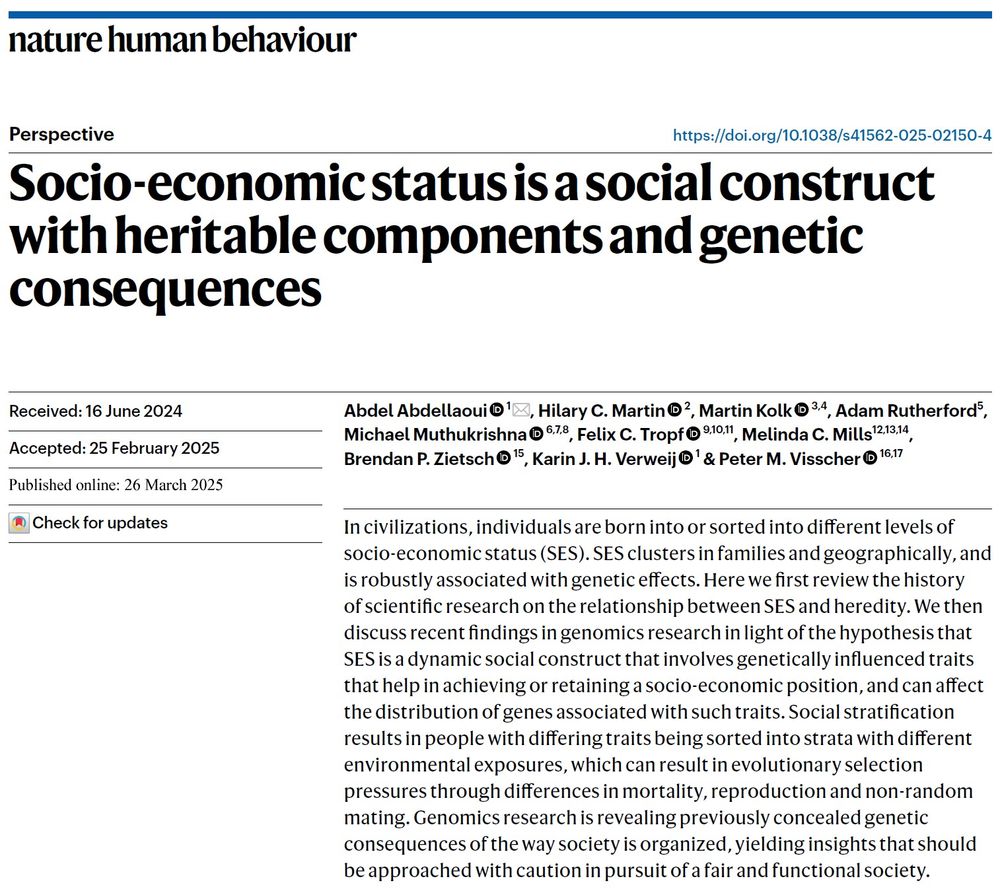
March 26, 2025 at 11:16 AM
In every civilization, people end up sorted into levels of socio-economic status (SES). We explore the history, present, and future of scientific research on the complicated relationship between SES and DNA in @naturehumbehav.bsky.social💰🧬🎓
Link: rdcu.be/efacK
Thread below 👇🏽
Link: rdcu.be/efacK
Thread below 👇🏽
New study by Klein, Saarela, and Kolk.
The religious live longer!
Full table approach to mortality by religion.
The religious live longer!
Full table approach to mortality by religion.
Which religion you follow matters for life expectancy. Even in a secular country such as Finland, there are differences of up to six years between different denominations.
www.demographic-research.org/articles/vol...
@martinkolk.bsky.social
www.demographic-research.org/articles/vol...
@martinkolk.bsky.social

March 20, 2025 at 9:29 AM
New study by Klein, Saarela, and Kolk.
The religious live longer!
Full table approach to mortality by religion.
The religious live longer!
Full table approach to mortality by religion.
In a new study recently published in Demography, Kolk, @jlucastilley.bsky.social, @ylvamoberg.bsky.social , von Essen, and Burn provide a detailed sociodemographic overview of the Swedish transgender population.
doi.org/10.1215/0070...
(@readdemography.bsky.social)
doi.org/10.1215/0070...
(@readdemography.bsky.social)

March 17, 2025 at 1:10 PM
In a new study recently published in Demography, Kolk, @jlucastilley.bsky.social, @ylvamoberg.bsky.social , von Essen, and Burn provide a detailed sociodemographic overview of the Swedish transgender population.
doi.org/10.1215/0070...
(@readdemography.bsky.social)
doi.org/10.1215/0070...
(@readdemography.bsky.social)
Compared to all previous societies in human history, financial transfers in old age have reversed in contemporary European welfare states such as Sweden.
Virtually none among the oldest (here aged 77+) receive transfers from their children, while it is very common to give downward transfers.
Virtually none among the oldest (here aged 77+) receive transfers from their children, while it is very common to give downward transfers.

February 25, 2025 at 10:52 PM
Compared to all previous societies in human history, financial transfers in old age have reversed in contemporary European welfare states such as Sweden.
Virtually none among the oldest (here aged 77+) receive transfers from their children, while it is very common to give downward transfers.
Virtually none among the oldest (here aged 77+) receive transfers from their children, while it is very common to give downward transfers.
People focusing on current global fertility declines rely nearly only on period data. Cohort and period trends can however look very different.
The declines in fertility in central & eastern Europe in the 1990s only resulted in quite modest eventual cohort TFR decline.
The declines in fertility in central & eastern Europe in the 1990s only resulted in quite modest eventual cohort TFR decline.


February 11, 2025 at 3:49 PM
People focusing on current global fertility declines rely nearly only on period data. Cohort and period trends can however look very different.
The declines in fertility in central & eastern Europe in the 1990s only resulted in quite modest eventual cohort TFR decline.
The declines in fertility in central & eastern Europe in the 1990s only resulted in quite modest eventual cohort TFR decline.
I svensk politisk debatt hör man ofta att miljöfrågor har blivit polariserade höger-vänster frågor.
Det kan säkert stämma på partinivå där partierna idag har divergerat, men bland invånarna i Sverige finns bara en mindre ökning för sambandet mellan ideologi och miljöintresse de senaste åren.
Det kan säkert stämma på partinivå där partierna idag har divergerat, men bland invånarna i Sverige finns bara en mindre ökning för sambandet mellan ideologi och miljöintresse de senaste åren.

January 24, 2025 at 4:45 PM
I svensk politisk debatt hör man ofta att miljöfrågor har blivit polariserade höger-vänster frågor.
Det kan säkert stämma på partinivå där partierna idag har divergerat, men bland invånarna i Sverige finns bara en mindre ökning för sambandet mellan ideologi och miljöintresse de senaste åren.
Det kan säkert stämma på partinivå där partierna idag har divergerat, men bland invånarna i Sverige finns bara en mindre ökning för sambandet mellan ideologi och miljöintresse de senaste åren.
Reposted by Martin Kolk
New research from Jesper Lindmarker PhD student at IAS together with @sd.se & @martinkolk.bsky.social. The study examines how marriage and cohabitation shape longevity across the life course, using Swedish register data.
link.springer.com/article/10.1...
link.springer.com/article/10.1...

January 21, 2025 at 1:11 PM
New research from Jesper Lindmarker PhD student at IAS together with @sd.se & @martinkolk.bsky.social. The study examines how marriage and cohabitation shape longevity across the life course, using Swedish register data.
link.springer.com/article/10.1...
link.springer.com/article/10.1...
Yet another study (this time by Claudia Goldin) that uses cross-sectional data, and finds evidence for a U-shaped pattern for gender equality and fertility, even though this pattern does not exist for (almost) any country across time.
www.nber.org/papers/w33311
www.nber.org/papers/w33311


January 9, 2025 at 11:22 AM
Yet another study (this time by Claudia Goldin) that uses cross-sectional data, and finds evidence for a U-shaped pattern for gender equality and fertility, even though this pattern does not exist for (almost) any country across time.
www.nber.org/papers/w33311
www.nber.org/papers/w33311
In our new preprint, we examine how environmental concerns shape public attitudes toward childbearing in Sweden. We find views linking environmental concerns with reproduction are widespread, even if we find less support that they affect behavior.
doi.org/10.17045/sth...
doi.org/10.17045/sth...
Attitudes towards childbearing, population, and the environment: Examining prevalence and demographic and psychological correlates
Environmental concerns may influence personal fertility decisions and general opinions about childbearing and population, but research on this topic is still relatively scarce. In two studies based on...
su.figshare.com
October 7, 2024 at 9:44 AM
In our new preprint, we examine how environmental concerns shape public attitudes toward childbearing in Sweden. We find views linking environmental concerns with reproduction are widespread, even if we find less support that they affect behavior.
doi.org/10.17045/sth...
doi.org/10.17045/sth...
Reposted by Martin Kolk
New paper out, using Norwegian register data.
Overall, our results are consistent with small to negligible effects of birth spacing behavior on (non-pregnancy-related) health outcomes for parents.
I was lucky to have two excellent collaborators: @martinkolk.bsky.social & Øystein Kravdal
Overall, our results are consistent with small to negligible effects of birth spacing behavior on (non-pregnancy-related) health outcomes for parents.
I was lucky to have two excellent collaborators: @martinkolk.bsky.social & Øystein Kravdal
Posted: “Birth Spacing & Parents’ Physical & Mental Health.” @kieronbarclay.bsky.social @martinkolk.bsky.social & O Kravdal find that “very short & longer ave. birth intervals ↑ the probability of care-seeking for physical health problems.” @mpidr.bsky.social
read.dukeupress.edu/demography/a...
read.dukeupress.edu/demography/a...

March 11, 2024 at 11:09 AM
New paper out, using Norwegian register data.
Overall, our results are consistent with small to negligible effects of birth spacing behavior on (non-pregnancy-related) health outcomes for parents.
I was lucky to have two excellent collaborators: @martinkolk.bsky.social & Øystein Kravdal
Overall, our results are consistent with small to negligible effects of birth spacing behavior on (non-pregnancy-related) health outcomes for parents.
I was lucky to have two excellent collaborators: @martinkolk.bsky.social & Øystein Kravdal
Reposted by Martin Kolk
Posted: “Birth Spacing & Parents’ Physical & Mental Health.” @kieronbarclay.bsky.social @martinkolk.bsky.social & O Kravdal find that “very short & longer ave. birth intervals ↑ the probability of care-seeking for physical health problems.” @mpidr.bsky.social
read.dukeupress.edu/demography/a...
read.dukeupress.edu/demography/a...

March 8, 2024 at 6:29 PM
Posted: “Birth Spacing & Parents’ Physical & Mental Health.” @kieronbarclay.bsky.social @martinkolk.bsky.social & O Kravdal find that “very short & longer ave. birth intervals ↑ the probability of care-seeking for physical health problems.” @mpidr.bsky.social
read.dukeupress.edu/demography/a...
read.dukeupress.edu/demography/a...
Reposted by Martin Kolk
No previous research has examined how large inequalities are when looking at total lifetime pensions. That is why Jiaxin Shi @mpidr.bsky.social and Martin Kolk (Stockholm University) examined the inequalities in lifetime pensions in Sweden. www.demogr.mpg.de/go/pension

October 25, 2023 at 8:14 AM
No previous research has examined how large inequalities are when looking at total lifetime pensions. That is why Jiaxin Shi @mpidr.bsky.social and Martin Kolk (Stockholm University) examined the inequalities in lifetime pensions in Sweden. www.demogr.mpg.de/go/pension

